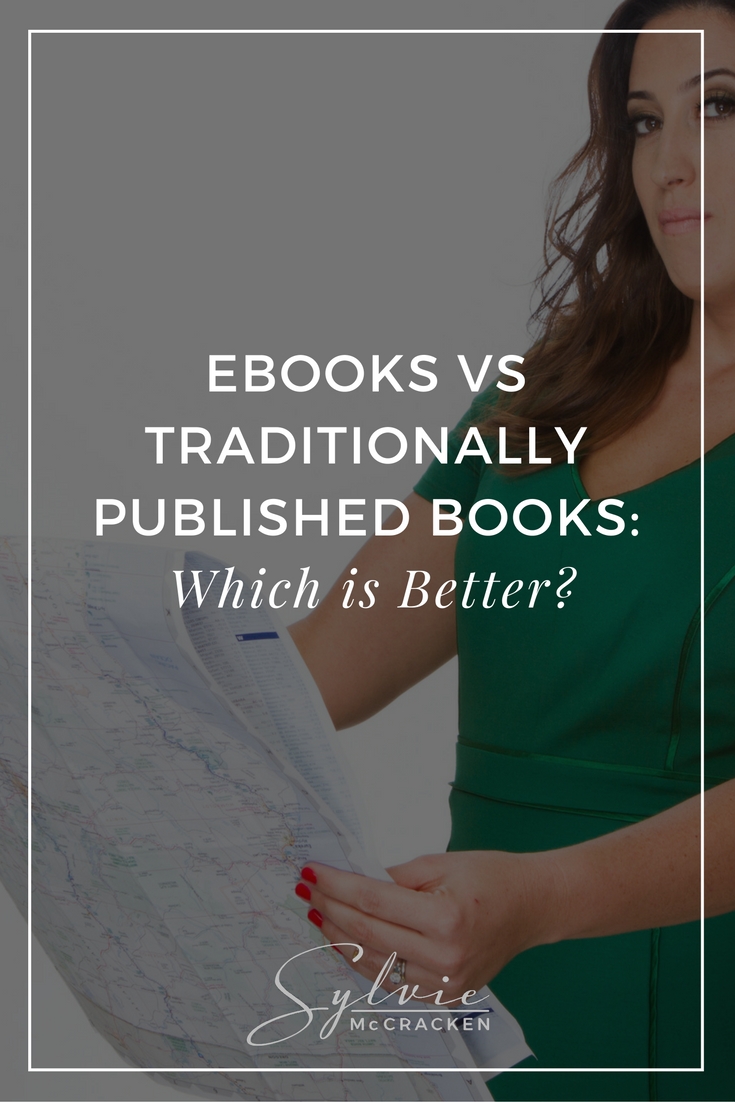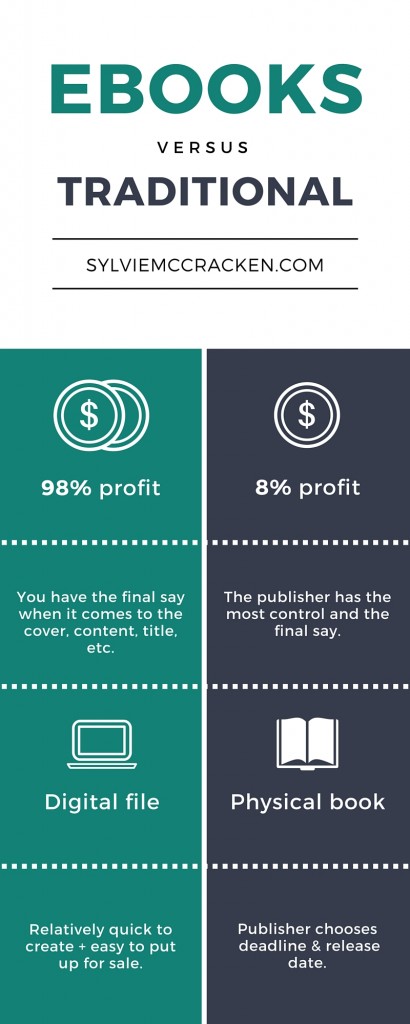
Ebooks vs Traditionally Published Books- Which Are Better?
Have you ever had “writing a book” on your bucket list? If so, you probably envisioned walking into a bookstore and seeing your beautiful book on a shelf. How exciting!
I hate to rain on your bucket list parade but today I’m here to talk about the (major) disadvantages to traditionally publishing a book.
As the creator of a course called Create Passive Income with Ebooks it’s probably no surprise that I recommend eBooks over traditionally published books and of course you can certainly do both but here is why I think you should prioritize ebooks, especially if your goal is to profit from this project.
1- More Control:
Ok so I might be a bit of a control freak but if I’m going to pore over an ebook for months I really want to have the final say in what goes in the book (or ebook). If you traditionally publish, the publisher will most likely have the final say from everything from the cover, to the content, the title, etc. Of course, there are ways around this with an agent crafting an awesome agreement ahead of time but the most common agreements will give the publisher ultimate control. I’ve seen clients and colleagues be dissapointed time and time again with cover photos they didn’t like, photographers hired they weren’t thrilled about and brutal editorial cuts. In some cases, with a little back and forth and some elbow grease from their agent, they were able to iron out several issues but most of the time the end result has been a compromise at best.
If you want a little bit more control, then an ebook you sell directly on your own website is probably the best route for you.
2- More Profit
With the traditionally published book the profit is a lot, lot lower, not only because there are middlemen involved (the publisher and perhaps an agent) but because there are additional costs involved in printing the book as there are with any physical product.
With a digital product the costs can be kept to a minium, and the only costs that are percentage based are the credit card or paypal fees and hosting the sales page on your site, both of which are nominal.
The difference in price is a lot more significant than many people realize. With a traditionally published book you can keep about 8% of the profits vs about 98% of the profits kept with an ebook.
These days, most publishers will expect you to come to the table with a pretty big audience and a loyal following already. They’re not really gonna get that for you. So if you have that already, or if you are building your own audience and your following, wouldn’t you want keep the majority of the proceeds of that hard work yourself?
With a traditional book you need to sell A LOT Of copies to make a decent income; with ebooks, not quire so much. I’ve had clients with very small list, and very small amount of traffic, and they’ve still made a pretty reasonable income right away from their eBooks. And of course that income increases over time as they grow their audience.
3- Speed
I don’t know about you, but I’m pretty impatient and I don’t want it to take 5 years to make a decent income from the hard work that I’m doing right now. So with an ebook you have quite a bit more speed. You can create it relatively quickly and you can put it up for sale relatively quickly as well. I recommend making quality of content a high priority so don’t rush it and try to churn it out in a week but there’s no reason it needs to take a year to get it finished as it often does with a traditionally published one.
With a traditional publisher, they will pick the deadline, the release date, and work it around their other clients, which means your release date might get moved around to accommodate their other clients release dates.
So, are there any advantages to traditionally publishing a book?
Sure! There’s still some prestige associated by being a New York Times (or other prominent list) bestseller or even just having a publisher behind your work.
It also might give your mom something to boast to her friends about. With the right idea, publisher and agent on your team, you might even be able to get more reach than you would on your own.
Regardless I would make sure that if you traditionally publish a book that you see it as an (expensive) business card for your other products and services as opposed to expecting to make a great income from it.
If you’re writing a book for the profits, hands down a pdf ebook sold on your site is the way to go.
To learn more about how you can create passive income with ebooks, download my cheat sheet with the 6 steps here.
I’d love to hear from you! Leave me a comment below and share this article with your friends!






I think e-books are definitely the future! E-books are actually better than traditionally published books as we have more control over the books and also the profit margins are more. Thank you for sharing all the advantages of e-books and traditional publishing. I really learnt a lot from this article.
I appreciate it when you said that since ebooks do not take a long time to be published, the author can make money out of it immediately. I guess the benefit of speed also works for readers since we do not have to wait a long time for the book to be released. That is the reason why I am looking forward to reading an ebook instead of a traditional book. Thanks!
I totally agree that a printed book should be seen as a particularly effective business card. People will hang onto a book, where they might ignore your card. Having said that, I’d be interested in your views on the difference between commercial publishing (in which the publisher is a company that takes control, as you’ve described) and self-publishing. I’ve done both, and I agree that having a traditional publisher doesn’t work well unless you already have a huge platform. That’s why I recommend self-publishing through any of the huge range of print-on-demand publishing houses. I use Createspace, which is part of Amazon. I can get author copies for about US$2.50 each. Do you see a distinction between commercial publishing and self-publishing via the P.O.D. route?
I would put the self published print book, which I’ve also done somewhere between ebooks and print books. The profit is much better than with traditionally published but still not as high as with ebooks. In a nutshell I feel like if profit is the goal, ebooks are the way to go and in rare instances a traditionally published book might be a good idea for the prestige it can bring. Thanks for your comment, Carl!
This is all true.
I have both traditionally published and self-published. I knew all of this before I chose to traditionally publish. I already had about 10 ebooks available. I did traditional only because it kinds of lends an air of credibility. I knew I’d make less money (I have), I knew the time line would be much longer (it was 18 months), and I knew that I’d have less control (I did, but with a supportive editor and an excellent co-author things went pretty well).
It’s okay. Both are valuable, just depends on what your goals are. But traditional publishing is not where the money is, if that’s what you’re after.
Thanks so much for your comment, Kate! 18 months- you are a patient woman! 🙂 Totally depends on your goals indeed.
Thanks for all your wonderful advice! I really love everything I have learned from you!
Could I give you a quick little piece of feedback? I hope that’s not out of place, but I have made lots of videos lately and have really appreciated people’s feedback.
I lvoe your personality and your message, and I would love it even more if you looked straight into the camera. In this video, you are looking just to the side instead of into your audience’s eyes, and it’s distracting. it’s subtle, but can make a big difference in connecting with your viewers.
Again, feel free to delete this comment if it’s out of place. I just thought that it would be a good learning experience for all of us.
You are doing wonderful work!
Blessings,
corina